Introduction
In case you didn't know, Axelerant publishes a routine People Report every month. We've been Inspired by our friends over at open.buffer and by popular request by team members, we've committed to sharing the good, the bad, and the ugly. We hope you'll find the transparency to be refreshing and interesting.
What are some highlights from this past month?
In March, we had been facing some issues with processing payroll and making sure that team members have visibility into taxation.
To address these challenges, we’re moving to new tools.
We’ve started moving to Zoho Payroll for fixing these issues with our payroll management.
With our previous system, the need for human intervention may have resulted in some confusion and created mistrust in the team about tax deductions. Now, with the new tool, most of the work is automated and managed within the tool. No human intervention is needed unless we change a team member’s pay. Tax calculations are made automatically, eliminating the need for manual validation. These changes are immediately visible to individuals. And everything is compliant with tax laws.
We’ve also been using KinHR for onboarding and record maintenance, but we’ve found it to be quite restrictive when it comes to customizing or extending functionality. So we’ll soon be moving to Zoho People as it offers more possibilities for us as we grow.
We’ll also be moving away from Xero, a tool we’ve been using for managing reimbursements, so that everything is consolidated in one place, and we don’t have any discrepancies in the payment process.
What went well this past month?
We ran appraisals for the year 2018-19.
We’d previously gathered from our regular Officevibe surveys that some team members were unhappy about their pay, and while we do have a salary correction request process in place, this wasn’t the best way for people to ask for that increment. In some cases people were relying on their managers for review.
In April, we proactively worked towards adjusting pay for a lot of pay bands. We based these adjustments on the engineering career ladders that we’ve established.
Simultaneously, we worked on some career ladders which did not exist previously, encouraging each department to work on developing these. While we still don’t have career ladders set up for every role, we are steadily addressing these gaps.
We’ve sped up our recruitment process.
We’ve also made some changes to our recruitment process. This has made it easier for us to ramp up and ramp down our hiring as needed, and reduced the overall process time.
This means we’ll have a lot more people joining in the weeks and months to come!
What went badly this month?
Payroll processing was a challenge
As we decided to migrate to Zoho Payroll mid-April, there was a lot of effort needed on the backend to complete the migration before closing the financial year. A lot of laborious manual work had to be completed—files and documents downloaded for each individual—before we could complete the migration.
To do the migration right, we needed more time. Some team members had to put in long hours and figure out how to automate parts of the process in order to get everything done by the 1st of May.
However, now that we have completed the migration to the new tool, this isn’t a scenario that can come up again as the tool automates most of these tasks.
We need some more time to ramp up our People Service Desk
Our internal service desk is facing some delays in responses.
We plan to resolve this by setting service level agreements (SLAs) for resolution of any issues raised via the service desk, and maintain a much faster response rate. But as we’ve had a lot going on in terms of tool migrations and so on this month, we’ve not had the bandwidth to set these up yet. This will be a focus for us going forward in May.
We’re updating policy documentation
We’re updating our company handbook with all the policy changes that we’ve rolled out recently, in order to make them simpler to read and walk through. We’ll be working on this too more actively in May, along with some other backlogged items that we hope to attend to.
We’re doing well in terms of engagement
In each engagement meeting, we include one major activity for our team members to participate in. This month’s activity focused on the thoughts we hold in mind each day. Through a guided exercise, team members were encouraged to observe the quality of the thoughts in their minds, and consider their impact on their emotional state, work, and relationships. This helped some of us to become more aware of unproductive thoughts and shift perspective on these.
What challenges are we facing in terms of engagement?
On one of our largest engagements that involves the majority of the team, team members reported working under conditions of high stress—putting in long hours, not having the freedom to push back on unreasonable demands from the client, and internal misalignment due to some people being unavailable. All this was impacting the team’s happiness—there were many frustrations and delays that individuals had to deal with.
In engagement meetings, people were able to share these frustrations, and individuals took responsibility and worked to resolve issues.
Another concern that came up this month from team members is that while they are receiving timely recognition for their work, they do not always receive critical feedback.
Continuous feedback is important for growth, and we encourage team members to give and request feedback regularly to help them continue to learn and advance.
To that end, we’ve created templates within our feedback and recognition system through which team members can ask for internal feedback. And we regularly encourage them to use these to support each other.
Our engagement score: How we’re doing by the numbers
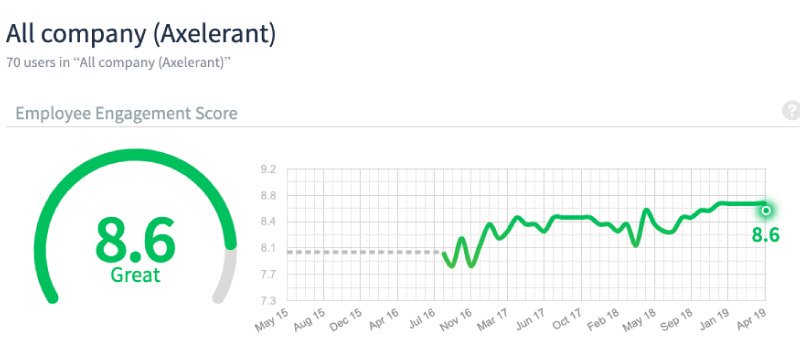
Overall, from December 2018 to now, our engagement score has held steady at 8.6 to 8.7. We’re very happy with this current score, considering that around the same time last year our score ranged from 8.2 to 8.3. This means we’ve been able to improve consistently over time.
We want to do even better in the months to come.
10 Supporting Metrics
These are the various metrics that are individually considered to generate the engagement score, and this is a snapshot of our scores for the month of April.
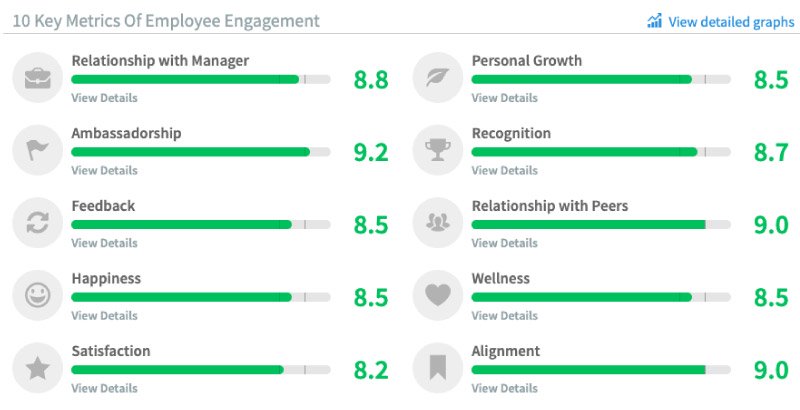
For our team at this point, the three lowest metrics are: Feedback, Wellness, and Satisfaction. While these are still healthy scores overall, we want to make sure we do everything we can to provide our team members the best environment possible.
Officevibe makes certain recommendations to help improve each of these, so these are going to be our focus over the coming weeks:
Satisfaction (8.2): ensure that team members feel that they are being compensated fairly, and address any concerns in a timely fashion.
Personal Growth (8.5): encourage employees to get better at their craft by providing coaching, training, etc.
Feedback (8.5): encourage employees to give feedback to each other, and to give feedback to their manager; it will help everyone improve.
ENPS (Employee Net Promoter Score)
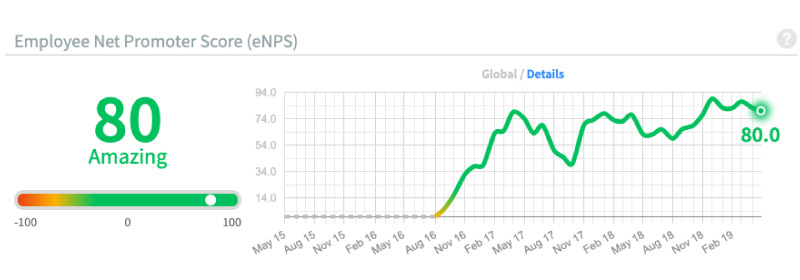
What else is happening for us?
We had meetups in several cities. Here are a couple shots:
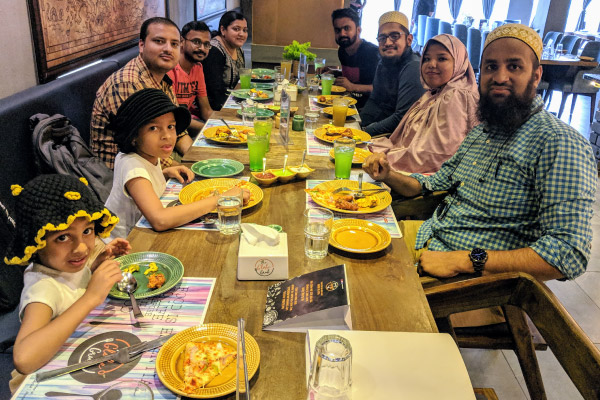 Bengaluru, India |
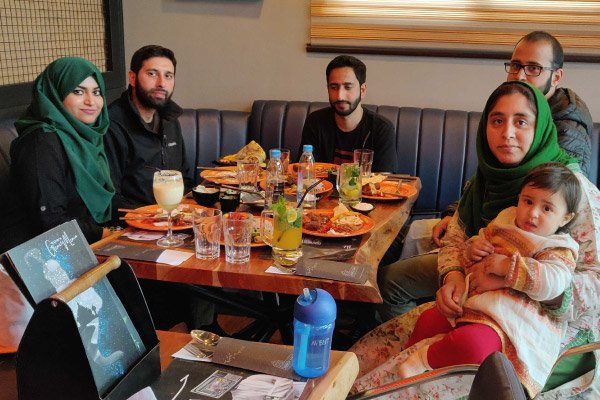 Srinagar, India |
In our monthly Happy Hour call, we spoke about "contribution."
Community contribution is something we were known for when we started out, and since then, our participation has gone down significantly.
“Giving” was one of our three core values, and even though we’ve shifted slightly away from this since, we believe that giving back to the community should still be part of our culture considering that we are highly reliant on Open Source.
With that in mind, we’re starting some conversations and putting some plans into motion that should help us get back on the front lines of community contribution and involvement.
Our hour-long monthly Happy Hour call is usually reserved for talking about fun themes and connecting freely with each other. This month, the topic in focus was community contribution.
Of those who joined the call, some were already contributing. We found that some who were not contributing were not clear about what community contribution was about, and how they could contribute. Speaking about it helped create awareness and understanding—and we believe we need to keep talking about it regularly.
Subsequently, in mentoring individuals to work on community involvement, it’s become clearer to us what issues people face when contributing. Going forward, we plan to introduce initiatives that will help address these, so that by 2020, we’re contributing on a regular basis.
For example, providing support to team members who are just starting out contributing in the form of a dedicated monthly one hour call (hosting this call will be a rotating responsibility), and bringing forward a list of issues that can easily be contributed to by beginners.
By holding ourselves to a monthly commitment like this, we hope to slowly enable more team members to contribute to the community.
We continued our regular knowledge-sharing initiatives. And we conducted a number of knowledge-sharing webinars internally in January. Some of the topics we covered:
- PHPUnit testing - which test to pick up when
- Caching REST API endpoints
- Ability to preview a theme in Drupal
- RouteSubscribers and Derivers
- Develop accessibility first web experiences
- Multitsite and multilingual test automation using Behat features files as templates
Axelerant Editorial Team
The Axelerant Editorial Team collaborates to uncover valuable insights from within (and outside) the organization and bring them to our readers.

 We respect your privacy. Your information is safe.
We respect your privacy. Your information is safe.


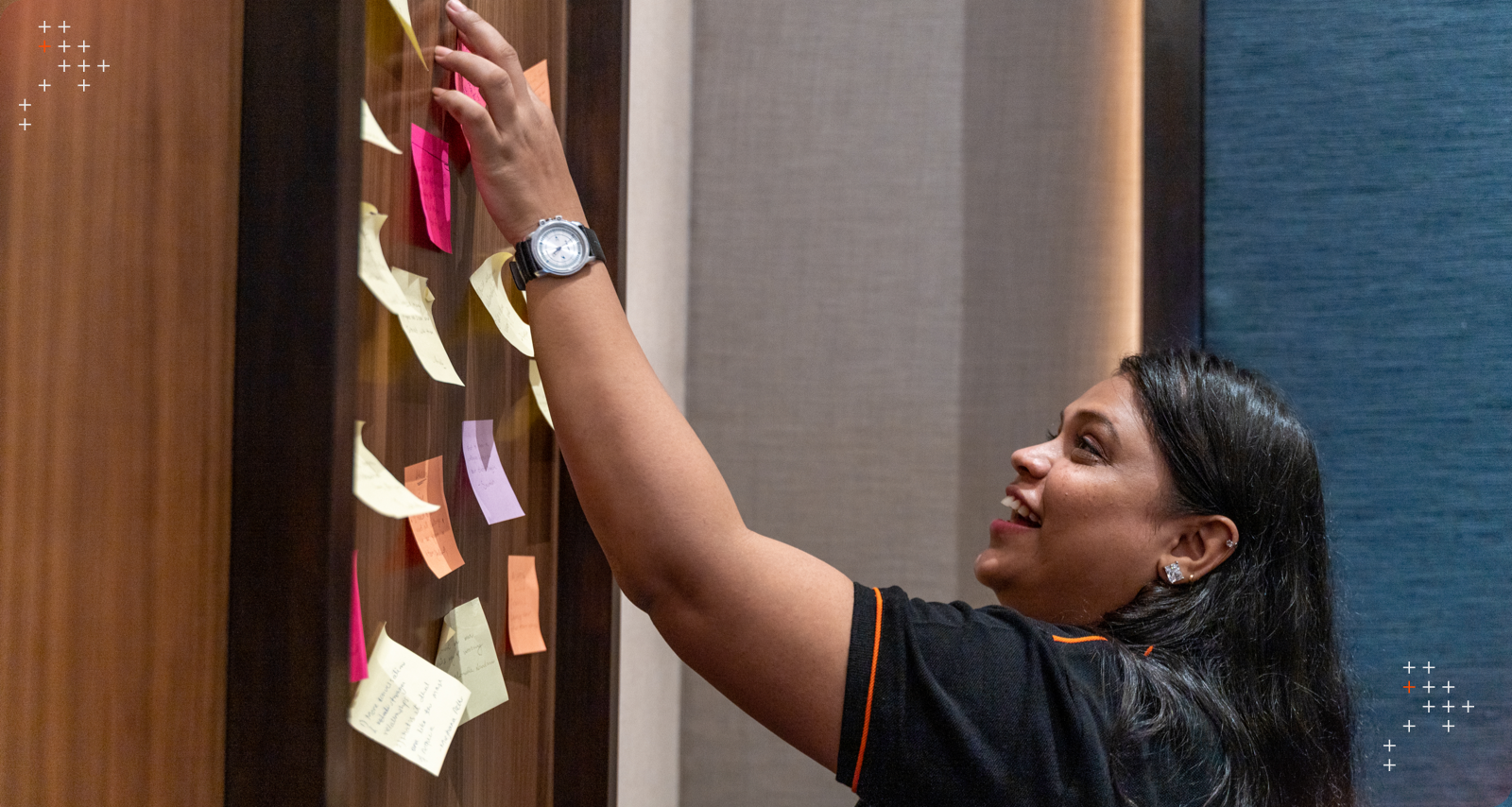

Leave us a comment